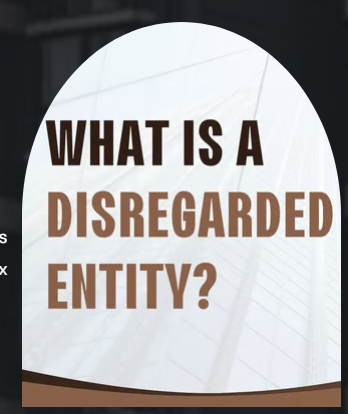What is a Disregarded Entity?
5/15/20253 min read


What is a Disregarded Entity?
Disregarded Entity is a business structure that the Internal Revenue Service (IRS) does not recognize as a separate entity from its owner for tax purposes. This means that the income, expenses, and other tax items of the business are reported directly on the owner's personal tax return.
Key Points About Disregarded Entities:
Common Examples:
Single-Member LLC (Limited Liability Company) – The most common form of a disregarded entity in the U.S.
Qualified Subchapter S Subsidiary (Sub) – If an S corporation owns another corporation and meets specific requirements.
Tax Treatment:
For a Single-Member LLC, the IRS treats the business as a sole proprietorship for tax purposes unless the owner elects to be taxed as a corporation.
The owner reports business profits and losses on Schedule C of their Form 1040 (individual income tax return).
Legal Distinction vs. Taxation:
While the IRS ignores the entity for tax purposes, it still exists as a separate legal entity under state law, providing liability protection to the owner.
Employment Taxes:
If a disregarded entity has employees, it must obtain an Employer Identification Number (EIN) and is responsible for payroll taxes.
Entity Classification Election:
If the owner wants the entity to be taxed differently (e.g., as an S corporation or C corporation), they must file Form 8832 (Entity Classification Election) with the IRS.
A Disregarded Entity is a business structure, typically a single-member LLC, that is legally separate from its owner but not recognized as separate for federal tax purposes. The income, deductions, and credits of the disregarded entity flow directly to the owner and are reported on the owner’s personal tax return, eliminating the need for separate business tax filings.
Disregarded Entity: Key Features
Single-owner structure: Only single-member LLCs are eligible.
No separate tax return: Income is reported on the owner’s personal tax return (e.g Schedule C or Schedule E).
Liability protection: The entity offers liability protection to the owner despite its tax treatment.
Self-employment tax: Owners are responsible for paying self-employment taxes on profits.
Frequently Asked Questions (FAQs)
Does a disregarded entity need to file a separate tax return?
No, a disregarded entity generally does not need to file a separate federal tax return. Instead, the entity’s income, expenses, and other tax items are reported directly on the owner's personal tax return. However, there are some exceptions depending on the entity type and activities.
Tax Reporting for Different Types of Disregarded Entities:
1. Single-Member LLC (SMLLC):
Owned by an Individual: Reports business activity on Schedule C (Profit or Loss from Business), Schedule E (Rental Income), or Schedule F (Farming Income) of Form 1040 (Individual Income Tax Return).
Owned by a Corporation or Partnership: Business income is reported on the parent company’s tax return (e.g., Form 1120 for a corporation).
2. Qualified Subchapter S Subsidiary (QSub):
Tax Reporting: The parent S corporation includes the QSub’s financial activity on its Form 1120-S (U.S. Income Tax Return for an S Corporation).
3. Employment and Excise Taxes:
If a disregarded entity has employees or is responsible for excise taxes, it must obtain an EIN and file the appropriate employment tax forms (e.g., Form 941 for payroll taxes).
When a Disregarded Entity Might File Separately:
· Electing Corporate Tax Status: If the entity chooses to be taxed as an S corporation or C corporation, it must file a separate return (Form 1120-S or 1120).
· Multi-State Operations: Some states may require separate state-level tax filings even if the entity is disregarded at the federal level.
No, the income and expenses are reported on the owner’s personal tax return.
Can a disregarded entity have employees?
Yes, payroll taxes must be filed for employees, even though the entity is disregarded for income tax purposes.
What tax form is used to elect a different tax classification?
Use Form 8832 to elect a different tax status, such as a corporation.
How does a disregarded entity differ from a sole proprietorship?
A disregarded entity offers liability protection, while a sole proprietorship does not.
Can a disregarded entity change its tax classification?
Yes, by filing Form 8832 to elect S-Corp or C-Corp status.
Is a disregarded entity required to obtain an EIN?
Only if it has employees or files federal tax returns like excise taxes.


ProTax Service
TAX SPECIALISTS
Accounting Excellence, Tax Mastery
Call or Email Anytime
Accounting service
